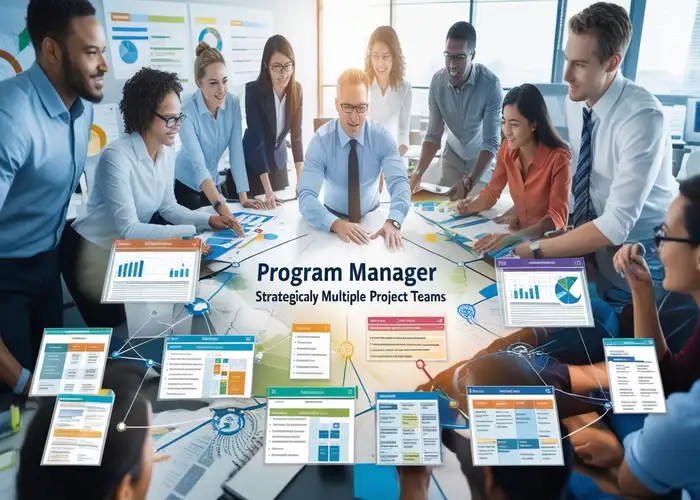Every day, program managers juggle complex projects and lead multiple teams toward shared goals. When walking into an interview for this role, you’re not just presenting your skills you’re showcasing your ability to turn chaos into order and vision into reality. To excel, understanding the key Program Manager Interview Questions is essential.
As you prepare, it helps to understand the types of questions that will reveal your capability to manage, strategize, and lead effectively.
This article breaks down the core questions you might encounter and provides practical tips to help you respond with confidence. Ready to transform your interview into a confirmation of your strategic skills? Let’s fall in and explore the questions that will help you shine.
Program Manager Facts
A Program Manager is like a conductor of an orchestra, guiding multiple projects to work harmoniously toward a common goal. They plan the big picture, keep everything on track, and make sure resources are used wisely.
Their job is to connect the dots between different projects, manage risks, and ensure everything adds up to real value for the organization.
Program Manager Interview Questions

1. Can you describe a time when you successfully managed a complex program?
Answer: In my previous role, I managed a program involving the development of a new software platform across multiple departments. I coordinated with various project teams, ensured alignment with business goals, and utilized Agile methodologies to keep the program on track. Regular check-ins and clear communication helped us deliver the project on time and within budget.
Tip: Highlight your ability to manage complexity, communication skills, and the methodologies you used.
2. How do you prioritize tasks and projects in a program?
Answer: I prioritize tasks based on their alignment with strategic objectives, deadlines, and resource availability. I use tools like the Eisenhower Matrix to categorize tasks and focus on high-impact activities. Regularly reassessing priorities ensures that we stay on track.
Tip: Demonstrate your organizational skills and your approach to prioritization.
3. How do you handle conflicts between project teams?
Answer: I address conflicts by facilitating open discussions between teams to understand their perspectives. I encourage collaboration and focus on finding common ground. When necessary, I mediate to resolve issues and ensure that conflicts do not derail the program.
Tip: Show your conflict resolution and mediation skills.
4. Can you provide an example of how you managed a program budget?
Answer: I managed a program budget for a product launch by closely tracking expenses and regularly reviewing financial reports. I used budget forecasting tools to predict and manage costs and made adjustments when necessary to stay within budget.
Tip: Highlight your experience with budget management and the tools used.
5. How do you measure the success of a program?
Answer: I measure success through key performance indicators (KPIs) such as project completion rates, stakeholder satisfaction, and achievement of strategic goals. Regular performance reviews and feedback help assess if the program meets its objectives.
Tip: Emphasize your understanding of success metrics and evaluation methods.
6. What strategies do you use for risk management in a program?
Answer: I use a proactive approach to risk management by identifying potential risks early, assessing their impact, and developing mitigation strategies. I also monitor risks continuously and adapt plans as needed to address new challenges.
Tip: Discuss your risk management techniques and how you apply them.
7. How do you ensure that program objectives align with organizational goals?
Answer: I ensure alignment by working closely with senior leadership to understand the strategic goals and then translating these into program objectives. Regular reviews and updates keep the program aligned with any changes in organizational strategy.
Tip: Show your ability to align program goals with broader organizational strategies.
8. How do you handle changes in program scope?
Answer: I manage scope changes by evaluating their impact on the program’s timeline, budget, and resources. I communicate with stakeholders to understand their needs and adjust the program plan accordingly, ensuring that all changes are documented and approved.
Tip: Highlight your approach to managing scope changes and maintaining control.
9. Can you describe your experience with program management software?
Answer: I have experience using tools like Microsoft Project and Asana for program management. These tools help me track progress, manage resources, and communicate with team members effectively. I also adapt tools based on the specific needs of the program.
Tip: Mention specific software and how you use them to manage programs.
10. How do you ensure effective communication within a program?
Answer: I establish clear communication channels and regular update meetings to keep all stakeholders informed. I also use collaboration tools and ensure that there is a feedback loop to address any issues promptly.
Tip: Showcase your communication strategies and tools used.

11. Describe a time when you had to manage a program with limited resources.
Answer: I managed a program with limited resources by prioritizing critical tasks, negotiating with stakeholders for additional support, and optimizing resource allocation. I also found cost-effective solutions to achieve program goals.
Tip: Demonstrate your resourcefulness and problem-solving skills.
12. How do you approach stakeholder management?
Answer: I approach stakeholder management by identifying key stakeholders, understanding their needs, and maintaining regular communication. I provide updates, address concerns, and ensure that their expectations are aligned with the program’s objectives.
Tip: Emphasize your stakeholder management techniques and engagement strategies.
13. What techniques do you use to track program progress?
Answer: I use techniques like Gantt charts and progress reports to track program progress. I also implement milestone reviews and performance metrics to monitor if the program is on schedule and within scope.
Tip: Discuss the tools and techniques you use for tracking progress.
14. How do you handle underperforming project teams?
Answer: I address underperformance by identifying the root causes and providing additional support or training. I also set clear expectations and work with the team to create an improvement plan, regularly monitoring progress to ensure better performance.
Tip: Show your approach to performance management and team support.
15. Can you give an example of a program challenge you faced and how you overcame it?
Answer: In a previous program, we faced a challenge with a critical project falling behind schedule. I implemented a recovery plan that included reallocating resources and adjusting timelines. By communicating transparently and focusing on key deliverables, we successfully got back on track.
Tip: Highlight your problem-solving skills and how you address challenges.
16. How do you keep yourself and your team motivated throughout a program?
Answer: I keep the team motivated by setting clear goals, recognizing achievements, and maintaining open lines of communication. I also provide opportunities for professional development and ensure that the team understands how their work contributes to the overall success of the program.
Tip: Discuss your methods for maintaining team motivation and engagement.
17. What is your approach to developing and mentoring team members?
Answer: I focus on understanding each team member’s strengths and areas for growth. I provide constructive feedback, set development goals, and offer training and mentorship opportunities. This helps build a strong, skilled team that can contribute effectively to the program.
Tip: Highlight your commitment to team development and mentoring.
18. How do you balance the demands of multiple projects within a program?
Answer: I balance demands by using project management tools to track progress and allocate resources efficiently. I prioritize tasks based on their impact and deadlines and ensure that team members are clear on their responsibilities and deadlines.
Tip: Demonstrate your organizational and time management skills.
19. How do you ensure that program deliverables meet quality standards?
Answer: I ensure quality by setting clear quality criteria from the start and implementing regular reviews and testing throughout the program. I also involve stakeholders in quality checks and feedback loops to ensure that deliverables meet their expectations.
Tip: Emphasize your focus on quality management and review processes.
To further enhance your preparation, check out the following video. It offers additional insights and practical advice on navigating Program Manager interviews, supplementing the questions and tips provided here.
The video provides valuable insights and practical tips for your Program Manager interview preparation. While it complements the detailed questions and answers provided here, it’s crucial to focus on how these insights align with the role’s demands and your strategic skills.
Review the 19 interview questions and answers thoroughly and integrate the advice from the video into your preparation. This combined approach will help you showcase your ability to manage complex projects, lead teams, and align with organizational goals effectively.
Get ready to turn your interview into a strong case for why you’re the perfect Program Manager candidate.
Final Analysis
Preparing for a Program Manager interview questions means showcasing how you handle complex projects and lead teams to success. By practicing answers to key questions, you’ll be ready to demonstrate your skills in managing budgets, resolving conflicts, and aligning with strategic goals. With the right preparation, you can confidently show that you’re the best fit for the role.
Get ready to turn your interview into a strong case for why you’re the perfect Program Manager candidate.
See Also: 29 Genuine Interview Questions For Business Development Manager
FAQs

What are the top 3 skills of a program manager?
As we move into 2024, it’s clear that successful Program Managers need a combination of leadership, organizational, and analytical abilities, along with a solid understanding of their industry.
What is the main role of a program manager?
Program Managers are tasked with generating innovative ideas, overseeing project budgets and timelines, and crafting long-term plans that align with company goals.
What is the focus of the program manager?
A Program Manager oversees the overall vision of a program, strategically guiding project managers to ensure that all projects align with the program’s goals. Each project within the program is handled by a project manager who coordinates the specific tasks and activities.



